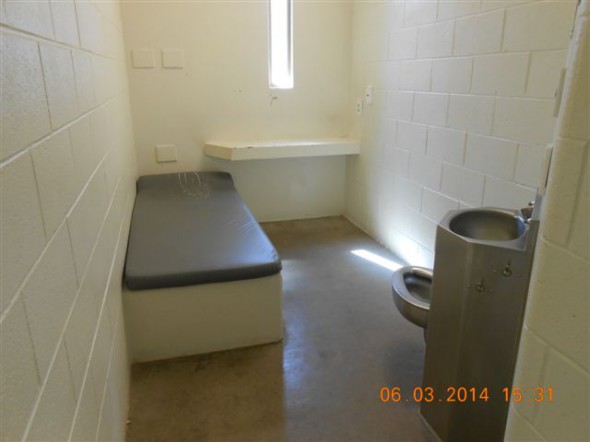Going Crazy in Solitary
Psychologist studied effects of isolation on many prisoners; the findings are grim.

A segregation cell at Waupun Correctional Institution in a June 2014 photo. Photo courtesy of Wisconsin Department of Corrections.
Craig Haney is a University of California-Santa Cruz psychologist who for more than two decades has studied the effects of solitary confinement on inmates. During a 2013 interview for PBS’ Frontline program, Haney described what happens to people held under such deprivation.“Some prisoners react very negatively very quickly. They experience what has been termed ‘isolation panic,’ ” Haney told Frontline. “The experience of being in a cell by oneself, isolated in a place where other prisoners are isolated, facing the deprivation of social contact, is overwhelming for people, and some people react with extreme anxiety reactions in the very beginning of this process.
“If a prisoner gets past that initial period and begins to settle in the environment, oftentimes the next thing that envelops them is depression. They begin to feel hopeless. They’re denied the opportunity to engage in meaningful activities, not just social interaction but typically meaningful activities of any kind, and they begin to lose a sense of purpose. Some prisoners begin to lose contact with reality.”
Beyond that, Haney said, prisoners can become prone to overreaction and rage. They sometimes try to harm themselves or do “outrageous things … just to prove that they’re still there.”
Dr. Kevin Kallas, mental health director for the Wisconsin Department of Corrections, said there are a “sizeable number” of prisoners who refuse to leave restrictive housing when they get the chance, and they commit additional offenses to remain there.
He said DOC is piloting a program at the Wisconsin Secure Program Facility in Boscobel to help ease prisoners back into the general population by allowing them to socialize with one or more other inmates.
But in his Frontline interview, Haney said it is not that prisoners like solitary confinement. They just do not know how to interact with people anymore. He calls it “social atrophy.”
“They don’t come out of their cell,” he said. “I’ve had prisoners tell me that they’ve lost control of their bladder because they’re so anxious. They’re frightened by a simple thing like having an interaction with another person where they’re not in restraints.”
In a New York Times interview published in August, Haney talked about his new research into the effects of such isolation on prisoners held between 10 and 28 years in solitary confinement in California’s Pelican Bay State Prison. Haney was quoted as saying some of those prisoners had experienced “social death.”
“They had lost who they were,” Haney told the newspaper, “and weren’t sure of who they had become.”
Cruel and Unusual
-
Jail Fees Can Leave Inmates in Debt
 Oct 4th, 2019 by Izabela Zaluska
Oct 4th, 2019 by Izabela Zaluska
-
Rules Violations Cause 40% of Prison Admissions
 Jul 3rd, 2019 by Izabela Zaluska
Jul 3rd, 2019 by Izabela Zaluska
-
Evers Faces Hurdles to Cutting Prisons
 Jul 1st, 2019 by Izabela Zaluska
Jul 1st, 2019 by Izabela Zaluska

















It has not proved to solve any problems and is very expensive. Just like death penalty, does not prove anythign and is far too much trouble.